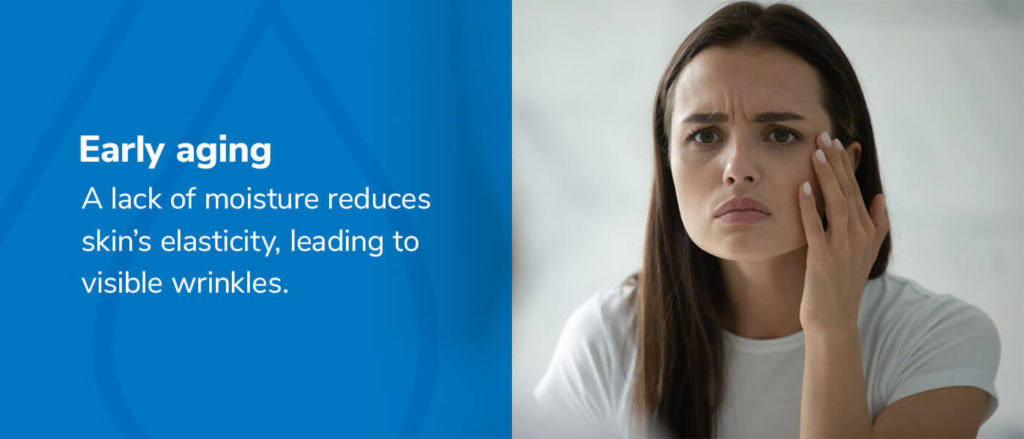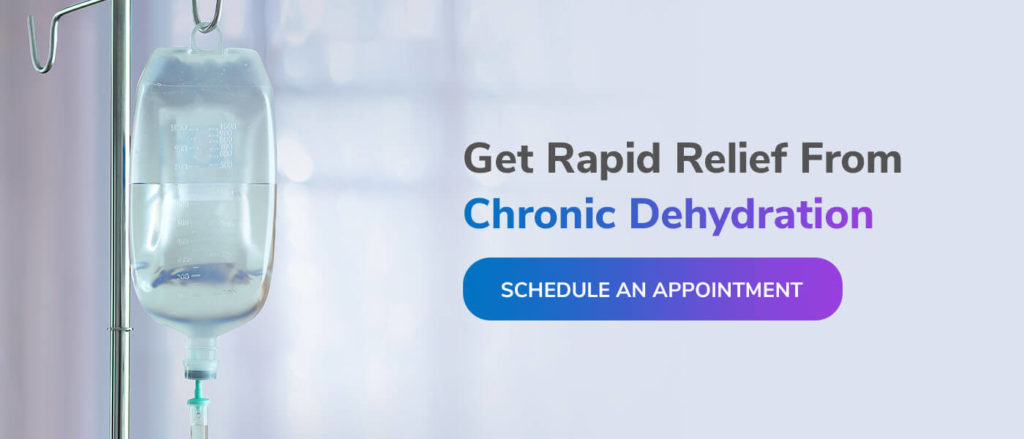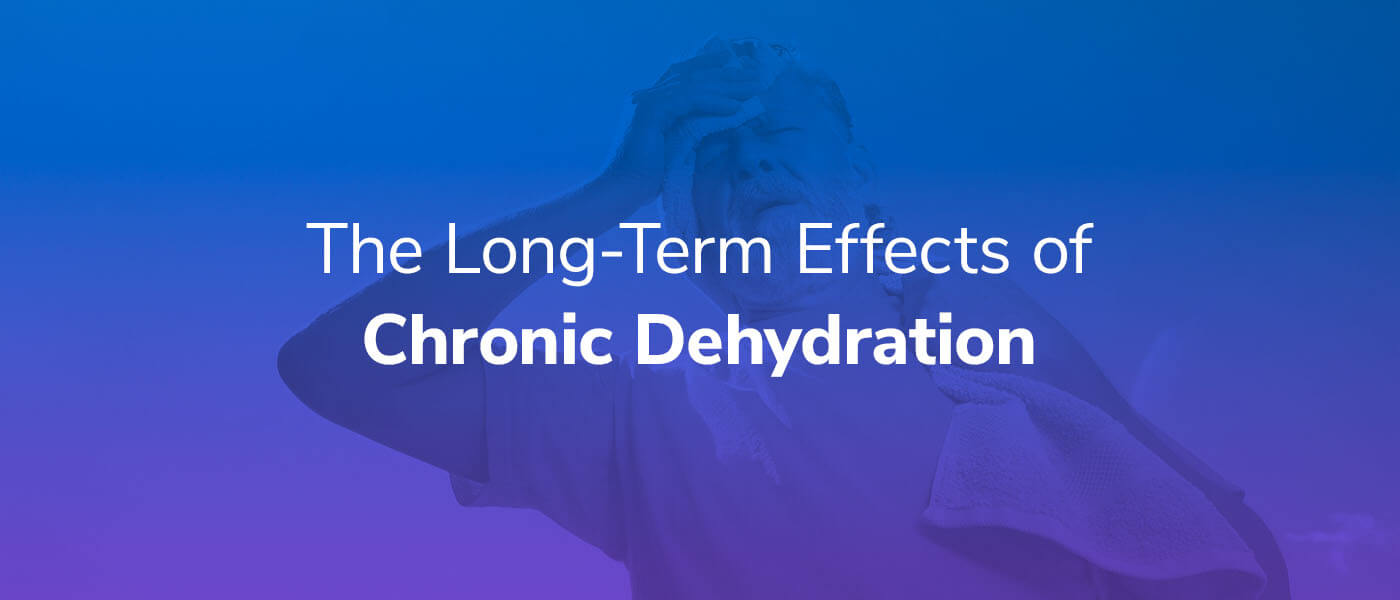Water is essential to our health. It accounts for 55%-60% of the adult body, performing vital functions such as lubricating joints, aiding digestion, flushing waste and toxins, keeping the skin and eyes healthy, and much more. However, as important as water is, many people aren’t getting enough of it.
Dehydration is a dangerous condition that can worsen pre-existing medical conditions and lead to many serious complications of its own. Read on to learn more about chronic dehydration, including signs and symptoms, causes, risk factors, long-term implications, diagnosis, treatment, and more.
What Is Chronic Dehydration?
Dehydration is a condition that occurs when you lose more fluid than you take in. This condition becomes chronic when you experience it over an extended time, continually forcing your body to work without sufficient water. Chronic dehydration can be mild or severe enough to warrant a hospital visit.
The Effects of Long-Term Dehydration
Prolonged dehydration has many damaging effects on the body, some of which may be long-term and evolve into more severe conditions. Below are the potential effects of chronic dehydration:
Moderate to Severe Dehydration Symptoms
- Constipation: When the body needs water, it reabsorbs extra fluid from the gastrointestinal tract. This transfer leaves stool to dry up and harden, becoming difficult to pass.
- Acid reflux: A lack of water means the stomach cannot adequately produce digestive acid. Improper digestion can produce gas bubbles that carry stomach acid into your esophagus.
- Muscle weakness and cramps: Toxins build up without enough water to flush wastes out of the body, causing muscle inflammation, sensitivity, and spasms.
- Wear and tear on joints: Water helps joint tissue provide shock absorption, lubrication, and cushioning. Without it, joints can’t function properly.
- Chronic fatigue: A decrease in fluid means a reduction in blood volume, which leads to low blood pressure and less blood flowing to the brain and muscles.
- High cholesterol: The drop in blood pressure and blood flow that dehydration causes also allows cholesterol to accumulate in the arteries. High cholesterol can cause strokes and heart attacks

- Early aging: A lack of moisture reduces skin’s elasticity, leading to visible wrinkles.
- Kidney stones: When the body lacks water, it will retain any fluid it does have to prevent further dehydration, leading to less urination. Without frequent bladder emptying, substances like calcium, uric acid, and struvite build up in the kidneys, leading to painful kidney stones.
What Causes Chronic Dehydration?
Chronic dehydration can result from many different things. Some common causes include:
- Lacking access to drinking water: Social status, disability, and financial means can all influence access to safe drinking water.
- Lack of water-rich foods in the diet: Some people don’t like the taste of fruits or vegetables, while others may have difficulty accessing nutritious food.
- Sweating from exercise or excessive heat: People who frequently engage in athletic activities or perform manual labor in warmer climates are at risk of chronic dehydration.
- Extended bouts of vomiting or diarrhea: The body loses fluid rapidly through vomiting and diarrhea, and it can be challenging to replace it as quickly as it’s lost.
- Kidney failure: Kidneys are responsible for balancing the fluid in our bodies and work hard to filter sugar out of the blood. When they fail, they aren’t able to keep the body hydrated. For example, diabetes makes it harder for the kidneys to keep up and excess sugar builds up in the bloodstream. That excess sugar uses urine to exit the body, resulting in frequent urination, which can lead to dehydration.
From Chronic Dehydration to Mild Dehydration – Who Is at Risk?
While chronic dehydration can affect anybody, some people are more at risk than others:
- Athletes: Overheating during an athletic performance or exercise will lead to sweating to help the body cool down. Excessive sweating coupled with inadequate water replacement can quickly lead to dehydration.
- Older adults: Older adults have a decreased thirst sensation, as well as naturally lower levels of fluid in their bodies. They are also more likely to have conditions or take medications that increase the risk of dehydration.
- People at higher altitudes: The body must work harder to pull in enough oxygen at higher elevations. One way it does this is through an increased breathing rate. However, faster and heavier breathing leads to greater water loss, putting those who live or work at high elevations at risk of chronic dehydration.
- Those with chronic illnesses: Uncontrolled diabetes or kidney disease can cause dehydration.
Symptoms of Long-Term Dehydration
The signs and symptoms of chronic dehydration differ depending on how dehydrated you are. For example, while feeling thirsty is usually the first hint that your body needs water, chronic dehydration can produce a decreased thirst sensation.
Indicators of chronic dehydration include:
- Frequent, consistent headaches.
- Decreased focus and concentration.
- Frequent dizziness and lightheadedness.
- Decreased urination in both amount and frequency.
- Dark, concentrated urine.
- Persistent fatigue and weakness.
- Muscle cramps.
- Constipation.
- Dry skin.
Diagnosing Chronic Dehydration
Doctors can often diagnose dehydration based on the reported signs and symptoms of dehydration alone. They can also check for other indicators like low blood pressure and increased heart rate. Some additional tests they may order to confirm the diagnosis and its severity include:
- Urinalysis: Urine can indicate whether a person is dehydrated and to what degree.
- Blood tests: Blood samples can reveal kidney function and electrolyte levels like sodium and potassium.
How Long Does It Take to Reverse Chronic Dehydration?
You can reverse most chronic dehydration in two to three days with proper treatment.
The time it will take to reverse dehydration will depend on its severity and the treatment method. Drinking water to replace fluids is a longer process than replacing them with intravenous (IV) fluid. In many cases, a combination of therapies is necessary to treat dehydration.
How Much Water to Drink to Stay Hydrated
Healthy adult men should consume 15.5 cups of fluid each day. For healthy adult women, the recommendation is 11.5 cups daily. While these guidelines may sound like a lot, they include fluid intake from water, other beverages and food. In fact, about 20% of your daily fluid intake comes from food!
Treating Chronic Dehydration
Chronic dehydration treatment depends on the severity of the condition. Some people will require immediate medical treatment or a hospital stay to correct their fluid imbalance after dehydration occurs while others can receive treatment at home. Regardless of the severity, part of your treatment will likely include ongoing measures to help prevent the dehydration from reoccurring.
Oral Rehydration Solutions
Treating chronic dehydration at home starts with drinking lots of pure water. If you don’t like the taste of plain water, you can try adding some fruit for an easy flavor boost. You should also eat foods high in water content, like fruits and vegetables, to help replace fluid and electrolytes.
Your chronic dehydration treatment may also include regular appointments for IV therapy to help you feel the benefits of rehydration right away.

Drinking water and eating healthy food can rehydrate your body, but not as fast as IV therapy. This treatment places fluid into your bloodstream, bypassing your digestive system and quickly hydrating your organs and tissues. If you are chronically dehydrated due to exercise, illness, alcohol, or simply not drinking enough water, Mobile IV Medics is here to help.
Mobile IV Medics’ team of health care professionals comes straight to your door when you want to feel better fast. We have a variety of pharmacist-crafted IV drips to help alleviate the symptoms of conditions like hangovers, migraines, chronic pain, and more. You can also build your IV drip based on your symptoms!
At Mobile IV Medics, we offer specialized IV Therapy services delivered in the comfort of your home, office, or hotel room in California, Colorado, Florida, Georgia, Illinois, Nevada, Pennsylvania, Tennessee, or Texas.
Schedule an appointment online today — our registered nurses are ready to come to you with an IV to get you back on your feet in no time. Questions? Call or text us at 833-483-7477
Related Articles:
- What Is IV Glutathione Good For?
- View Our IV Treatment Menu
- How Can I Hydrate My Body Without Drinking Water?
- What Is The Myers’ Cocktail?





